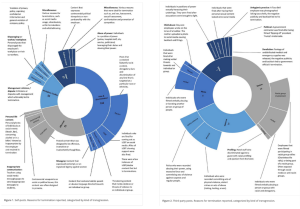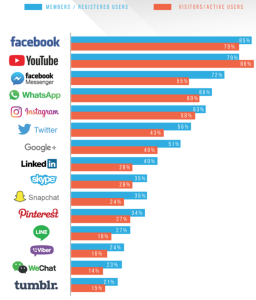Big Corporate: Big Brother?
By Tajesvi Bhat | October 20, 2022
Have big corporations taken advantage of social media platforms in order to expand their reach and power beyond all limits?
Social media is so integrated in our lives that it has introduced an entire new subcategory of communication: DMs (Direct Messages). While originally only between friends and family, DMs and social media have spread to the professional world. The advent of LinkedIn- a professional networking service- encouraged the applications of social media mannerisms such as DMs for professional opportunities, networking, and recruiting. Hiring managers did not limit themselves to the confines of LinkedIn though, and used mainstream social media platforms in order to assess the “professional value” of an employee (Robards,2022).
Cybervetting, a thorough investigation of an individual’s social media presence, is increasingly being used by hiring managers and companies in an attempt to decide which employees seem to match the company values and would be able to integrate themselves successfully with the existing company culture. A study published in March 2022 analyzed reports of employment terminations as a result of social media postings. They found that the terminations largely fell in 2 categories: those as a result of self-posts and those as a result of third party posts (ie. someone else posting something in which the individual is mentioned or is involved). As a result of social media investigations, these employees were consequently terminated and the employer’s reasonings for terminations were noted. The below image shows a breakdown for the most common reasons for employee termination for both self-posts and third-party posts:
IMAGE 1: Distribution of Employment Termination Reasons across Self and Third-Party posts (Robards,2022)

The most common source for this information was Facebook, closely followed by Twitter. The most common reasonings for firing for self-posts being racial discrimination. The most common reasonings for firing for third party posts was: . The most common careers who are and have been held accountable as a result of their social media presence are: law enforcement, education workers, hospitality, media, medical, retail, government, and transport workers.
Employers justify the use of cybervetting as a “form of ‘risk work’, with the information collected online used to mitigate risk by determining compatibility and exposing red flags that would suggest a misfit, compromise the image of the employer, or disrupt the workplace” (Robards,2022). The normalization of this practice raises questions about employee visibility as well as the ethical boundaries of employers and Freedom of Speech protections. According to Robards’ study, “27% of participants experienced employer “disapproval” of their social media activities, and some even experienced attempted influence of their use of social media by employers” (Robards,2022). Clearly, cybervetting is a process that is not limited to hiring, and rather continues for the duration of employment. It is incredibly concerning that employers are watching employee social media posts as it is most likely being done without their consent or knowledge, and also the reasoning behind it is not entirely clear. While it is understandable that an employer would want to ensure employees are following their policies and general code of conduct, is that something employees need to follow outside of work hours and off of company
property? Cybervetting also introduces further opportunity for bias and discrimination (which are already prevalent in the hiring process) and narrows the gap between personal and professional lives.
While high school students are often told to be wary of their social media presence as they apply to colleges, no one reminds the every-day adult to be cautious about social media usage since it is often not considered. However, it clearly is a common occurrence that is causing adults to either reconsider their social media usage, limit their account accessibility, or create fake profiles. This surveillance has an enormous impact on the youths who are more likely to alter their personality, or at least their digital personality, and develop a false persona in order to portray themselves as an exact match for future employer expectations. In fact, this general awareness on surveilled social media has influenced the creation of “finstas” (fake instagram accounts) and tactics including “finely tuned privacy settings, deleting content, and maintaining multiple profiles for different imagined audiences” (Robards,2022) in an attempt to provide security and anonymity. In addition to fake accounts, individuals now attempt to use platforms that employers may be less likely to see such as Tumblr versus Facebook, and it will be interesting to see how the platform of choice for the most security and lowest visibility change over time. This creates, and promotes, an alternate reality in which individuals are catering to expectations rather than being their true selves as was the original intent of social media platforms.
IMAGE 2: Most commonly used social media platforms

Public response to employment terminations due to social media postings have been divided between two general categories: either termination was caused by public outcry, or the termination resulted in public outcry. The first is a pleasant surprise because it indicates that the companies are learning to hold not only themselves, but also their employees accountable for actions that are generally deemed inappropriate. However, it also implies that the company is taking action only to satisfy the public and that otherwise it would have done nothing. The employer also then falls prey to the idea of putting on a false persona in order to regain social approval. The second category is when corporations misuse their reach and monitoring of social media platforms in order to terminate employees for speaking out against harsh working conditions, health and safety risks, or share their general disapproval for corporate policies or proceedings. Social media monitoring by employers overall seems to be an invasion of personal rights and freedom of speech, and termination or hiring decisions are incredibly prone to bias but unfortunately continue to be heavily prevalent today. Caution is advised to those who post on social media, big brother truly is watching.
Sources
Robards, B., & Graf, D. (2022). “How a Facebook Update Can Cost You Your Job”: News Coverage of Employment Terminations Following Social Media Disclosures, From Racist Cops to Queer Teachers. Social Media + Society, 8(1). https://doi.org/10.1177/20563051221077022
Image 2:
https://www.socialsamosa.com/2019/03/infographic-most-popular-social-media-platforms-of-2019/
